|
|
|
Sort Order |
|
|
|
Items / Page
|
|
|
|
|
|
|
| Srl | Item |
| 1 |
ID:
143344
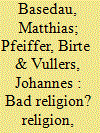

|
|
|
|
|
| Summary/Abstract |
Anecdotal evidence from many armed conflicts suggests that religion incites violence. Theoretically speaking, several facets of religion can create motives and opportunities to overcome the collective action problems associated with organized violence. However, empirical research has hitherto found no conclusive answer on the extent to which religion is connected to armed conflict onset. Contributing to the filling of this gap, we use a new database that incorporates important religious factors that previous studies left largely untested. The data set covers 130 developing countries for the period 1990 to 2010. Results from logistic regressions confirm our expectation that certain religious factors fuel armed conflict—in particular, the overlap of religious and other identities, religious groups’ grievances, and religious leaders’ calls for violence. We also find that religious determinants vary in their impact according to whether conflicts are religious or not in origin.
|
|
|
|
|
|
|
|
|
|
|
|
|
|
|
|
| 2 |
ID:
109142
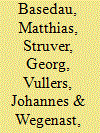

|
|
|
|
|
| Publication |
2011.
|
| Summary/Abstract |
Theoretically, the "mobilization hypothesis" establishes a link between religion and conflict by arguing that particular religious structures are prone to mobilization; once politicized, escalation to violent conflict becomes more likely. Yet, despite the religious diversity in sub-Saharan Africa and the religious overtones in a number of African conflicts, this assumption has not yet been backed by systematic empirical research on the religion-conflict nexus in the region. The following questions thus remain: Do religious factors significantly impact the onset of (religious) armed conflict? If so, do they follow the logic of the mobilization hypothesis and, if so, in which way? To answer these questions, this article draws on a unique data inventory of all sub-Saharan countries for the period 1990-2008, particularly including data on mobilization-prone religious structures (e.g., demographic changes, parallel ethno-religious identities) as well as religious factors indicating actual politicization of religion (e.g., inter-religious tensions, religious discrimination, incitement by religious leaders). Logit regressions suggest that religion indeed plays a significant role in African armed conflicts. These findings are compatible with the mobilization hypothesis, and stress the impact of conflict-prone religious structures, and particularly, the fact that overlaps of religious and ethnic identities are conflict-prone. Future research should investigate the religion-ethnicity-nexus in more detail.
|
|
|
|
|
|
|
|
|
|
|
|
|
|
|
|
| 3 |
ID:
126444
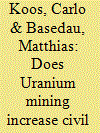

|
|
|
|
|
| Publication |
2013.
|
| Summary/Abstract |
We investigate whether uranium, similar to other resources, is associated with armed conflicts. The analysis uses grid cells in Africa to test this hypothesis. Results from logistic regressions reveal that uranium operations are not an independent conflict risk; however, it is significantly linked to local conflict events when interacting with ethnic exclusion. The analysis is supplemented by process tracing in four countries, where armed conflict broke out after uranium operations started (DR Congo, Central African Republic, Niger and South Africa). We find substantial evidence for a link only in the case of Niger. Our results suggest that uranium promotes intrastate conflict only under specific circumstances.
|
|
|
|
|
|
|
|
|
|
|
|
|
|
|
|
| 4 |
ID:
185191
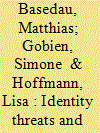

|
|
|
|
|
| Summary/Abstract |
Religion has become increasingly contentious in recent years. Faith-based discrimination, hostility and violence seem to have increased worldwide. But how can faith lead to conflict? In this article, we test the impact of two important dimensions of religion that have been neglected in previous research: the belief in ‘one true religion’ and perceptions of threats by other religious groups. Putting these two potential drivers to the test, we conducted a representative survey experiment with 972 respondents in Dar es Salaam, Tanzania. Results show that one of the tested dimensions, perceptions of threats by others, increases the support to use violence to defend one’s own group. This is particularly the case for religiously intolerant respondents with characteristics such as pre-existing threat perceptions, unfavorable views on intermarriage, or belief in the superiority of their own faith. In contrast, we find relatively weak evidence that the prime of ‘one true religion’ increases the readiness to use violence. Our findings have important implications for policy: We conclude that appeals by leaders to threats by others and intolerance toward other faiths can contribute to more conflict. Political and religious leaders should refrain from capitalizing on such notions and should promote tolerance towards other faiths instead.
|
|
|
|
|
|
|
|
|
|
|
|
|
|
|
|
| 5 |
ID:
188825
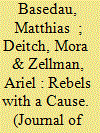

|
|
|
|
|
| Summary/Abstract |
Ideology may directly provide motive and indirectly capacity for collective violence, thus making armed conflicts longer and bloodier. We investigate these propositions by drawing on an innovative global dataset which codes ideological claims by rebel groups and governments in intrastate armed conflicts since 1946. Results demonstrate that although ideology increases conflict duration, these effects vary by type and timing. Whereas secular ideological conflicts tended to be more protracted during the Cold War, religious ideology has become increasingly important since. We, however, find little evidence that ideology increases conflict intensity. Rather, rebel criminality best accounts for intensity. So, while immaterial resources like ideology sustain willingness to fight, ideology’s influence upon conflict intensity is limited, especially after the Cold War. Future studies need to take ideology seriously and need to investigate its characteristics more in-depth and in conjunction with material, identity related and international variables.
|
|
|
|
|
|
|
|
|
|
|
|
|
|
|
|
| 6 |
ID:
093086
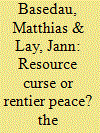

|
|
|
|
|
| Publication |
2009.
|
| Summary/Abstract |
The 'resource curse' hypothesis claims that abundance in natural resources, particularly oil, encourages especially civil war. Natural resources provide both motive and opportunity for conflict and create indirect institutional and economic causes of instability. Contrarily, the theory of the rentier state - largely neglected in the study of peace and war in this respect - suggests that regimes use revenue from abundant resources to buy off peace through patronage, large-scale distributive policies and effective repression. Consequently, such rentier states would tend to be more stable politically and less prone to conflict. These two theories thus imply ambivalent effects of resource abundance on conflict proneness. This article presents part of a solution to this apparent puzzle for the case of oil-producing countries. The key argument is that both resource wealth per capita and resource dependence need to be taken into account, since only the availability of very high per capita revenues from oil allows governments to achieve internal stability. The empirical analysis supports this hypothesis. The findings of multivariate cross-country regressions indicate a U-shaped relationship between oil dependence and civil war onset, while high resource wealth per capita tends to be associated with less violence. The results of a macro-qualitative comparison for a reduced sample of highly dependent oil exporters are even more clearcut. Using the same reduced sample, we find that oil-wealthy countries apparently manage to maintain political stability by a combination of large-scale distribution, high spending on the security apparatus and protection by outsiders. Compared to oil-poor countries and in contradiction to the rentier state theory, the institutions of oil-wealthy countries do not seem to be particularly characterized by patronage and clientelism.
|
|
|
|
|
|
|
|
|
|
|
|
|
|
|
|
|
|
|
|
|